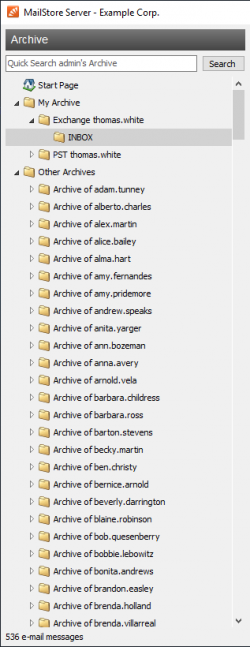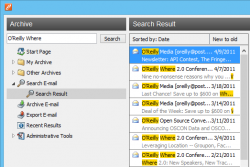Accessing the Archive
Overview
MailStore provides several ways to access archived emails:
Access Using MailStore Client Software
MailStore Client is a Windows application that can be installed on any number of user computers (depending on the license purchased). Of all the options for accessing the archive, MailStore Client provides the largest range of functions: Not only can users browse and view their emails but, depending on the privileges assigned to them, set up and execute archiving and exporting tasks.
Access Using Microsoft Outlook Integration
With a MailStore add-in, users can access the archive directly from Microsoft Outlook. The add-in can be included in the installation of MailStore Client.
Access Using Web Access
MailStore Web Access provides access to the archive using an internet browser. This has the advantage that no additional software needs to be installed on the user machines. In addition to browsing and viewing emails, web access also offers access through the folder structure and functions for restoring emails from the archive.
Access Using iPhone and iPod touch
Users can access the archive using their iPhone or iPod touch using a version of MailStore Web Access specialized for these devices.
MailStore Client
Searching by Folder Structure
MailStore stores all archived emails in a MailStore-specific folder structure, in which emails are displayed using the same structure as their corresponding source application. This means that folders created in the source application (e.g. Microsoft Outlook) are not changed during the archiving process and can be found easily in MailStore as well.
User Archives
For every user, MailStore creates a folder called My Archive on the highest level of the folder structure. Each folder corresponds to the user archive of the respective user and contains all his or her emails.
If the user has access to the archives of other users, their folders are listed as Archive of <User Name>.
Opening a User Archive
To open a folder, click on the plus sign [+] next to the folder name (as is done in Windows Explorer). Proceed the same with any subfolders.
Viewing the Emails in a Folder
To view the emails in a folder, simply click on the folder name. The emails will be listed below the folder structure.
Click on the text Sorted by: <value> to change the order in which emails are displayed. Emails can be sorted according to:
- Date
- From/To (sender/recipient of the email)
- Subject
Click on the Field to the right of Sorted by (called New to old in the graphic) to reverse the order in which emails are arranged. By default, the latest email is displayed first.
Number of Emails Contained in a Folder
The number of emails in the current folder is shown below the list of messages.
Refreshing the View
To refresh the list of folders, click on a folder and press F5 on your keyboard.
Click on the folder again to refresh the list of emails.
Creating, Renaming and Deleting Folders
Information about how to create, rename and delete folders is available in chapter The MailStore Folder Structure.
Quick Search
With MailStore's integrated quick search feature, users can browse through all emails in all user archive where they have access to. Quick search is especially suitable for simple queries. Alternatively, an Extended Search can be used.
Using Quick Search
Quick search is located in the upper left area of the application window. Simply enter one or more keywords into the search field and click on Search or press Enter. Search results are displayed in the lower left area or the window. If a keyword appears in the header or the subject line, it is highlighted.
Searching for Word Fragments
To view all emails containing a particular word fragment, use the wildcard character ( * ). For example:
auto*
would locate "auto", "automatic", "automobile" and others.
Searching for Phrases
To search for words appearing consecutively and in a certain order, use quotation marks ( "" ). For example:
"Microsoft Windows"
would only locate Microsoft Windows, not Microsoft Works or Windows 95.
Narrowing by Fields
A search for keywords or phrases can be limited to particular fields. For example:
subject:News only in Subject from:[email protected] only in From to:[email protected] only in To cc:[email protected] only in Cc bcc:[email protected] only in Bcc
Excluding Words
To narrow a search, it may be desired to specify words that must NOT be present in the emails. To exclude keywords from the search results, simply place a minus ( - ) sign in front of them. For example:
ZDNet -download-hint
would locate all emails from ZDNet, but not download-hint.
Combining Search Options
The search options described above can also be combined. For example:
ZDNET -"Daily Update"
would locate all emails from ZDNet which do not contain the consecutive words Daily Update.


